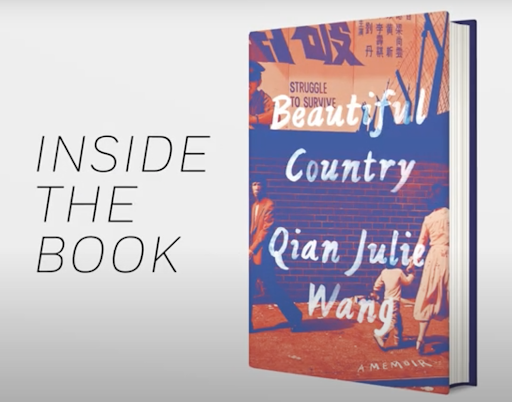
Qian Julie Wang’s memoir of her childhood as an undocumented immigrant in New York is an eye-opening read for everyone, especially those who have always been privileged enough to never worry about their nationality and rights as natural-born citizens. Wang’s words shed light on a reality in the shadows that many of us have never even bothered to look for.
Yet, it is likely a reality that many of the students on our own campus have gone through themselves, a story they are not ready to share with their closest friends. If the time ever comes when a student at St. John’s is willing to divulge their past and present struggles with citizenship and identity, reading Wang’s book can be a stepping stone towards genuine empathy.
You’ve probably read an immigration story or two. But Wang’s memoir is different from most in that it spans only a few years: second grade through middle school. When you read, you feel like you’re traveling beside her. Waiting for the train in the subway, reading the same books on the library floor, eating the same meager meals at the kitchen table in the tiny apartment. There might even be some shared memories: an embarrassing first day at school, being excited to eat at McDonald’s or begging your parents for a pet.
As a child, she was consumed with concerns about her and her family being found out and consequently deported. Her family had left China in 1994. The migration was led first by her outspoken father, whose academic family had been persecuted during the Cultural Revolution. As an English professor, her father felt stifled by the major changes being made in China’s political and cultural scene. He sought out the “American dream” of the United States, or Mei Guo, the “beautiful country” in Chinese. Her mother, a mathematics professor, followed because the persecution for their political beliefs in China made moving to America seem like the only answer. However, Wang’s parents find themselves at the very bottom in the memoir; she often writes about searching for free items thrown onto the street by well-off New Yorkers.
One example she recalls is her encounter with a truck that seemed to be handing out food to Chinatown residents. Her nose couldn’t betray her; the food smelled delicious and her stomach growled in agreement. But when she saw the uniformed officers, her body could not win over her mind. She ran away from the street, back toward the safety of the sweatshop her mother worked at. She writes, “on that run, only one thing kept pace with me, and it was not hunger. It was fear. Fear was all I tasted; fear was all I contained; fear was all I was.” One can’t help but think: how many other hungry children would be able to pull themselves away from a free meal? That was how heavy her burden of being undocumented was in America.
After they mildly improve their finances, Wang’s parent’s relationship becomes tense. When her mother becomes extremely ill and requires immediate medical attention, the importance of making it in America with the possibility of deportation hovering above their heads becomes unbearable. Her only confidante is literature. Since moving to the United States, books had been her only friend, even when she couldn’t understand every word. In spite of teachers’ doubts about her fluency, and various claims that her school work wasn’t hers at all, Wang could not pull herself away from the pages. Reading was how she escaped from a place out to get her. Reading was how she forgot there was a home – wherever that was – for her to long for. Reading was how she dreamed of a place where she didn’t need to lie.
When her mother recovered, they moved to Canada, a country looking for educated immigrants. The first thing a Canadian guard said to Wang was “welcome home.” By being in Canada, they were able to entertain a future of peace. They visited China with their new legal passports and Wang attended university. She went to Swarthmore College and Yale University for law school. But deep down, she hoped to move back to New York City.
St. John’s University in Queens, New York, is probably home to plenty of students who have suffered through similar struggles to Wang. With one of the most diverse student bodies and a multitude of countries represented, I am almost certain that there is someone on campus whose heart will resonate with Wang’s memoir. But a book like this might not serve as a mirror for those students. Instead, it is meant to be read by his or her peers so that their story, if ever revealed, could be met with tolerance and understanding. It is not easy to carry such burdens, and it would be even harder to be treated differently because of them.
It wasn’t easy to unearth the trauma of her childhood and put it on full display from cover to cover. Instead, Wang actually felt terrified by making such a bold move. “There were times when I took a full year off from writing,” Wang said. However, thinking about her future grandchildren was what inspired her to persevere and to keep writing. Now, she says that this book about overcoming adversity is the opportunity to help others who might be in the shoes she once wore.
Now, Wang is a managing partner of a law firm dedicated to advocating for civil rights in New York City. She lends her voice to those in need, and for the same reasons, she chose to write a book about her life in the “hei,” or in the shadows. Wang first began to ponder the creation of the book in 2016, after the Trump election. “I happened to be a[n] [American] citizen in May [2016] and felt such a privilege to speak up that so many undocumented Americans don’t have. But I had to process everything first so I spent a lot of time in therapy doing that. I did not see writing the book as therapy – there is no substitute for the real thing! But putting the story out into the world turned out to be therapeutic because my parents and I finally felt free from the secrets.”







